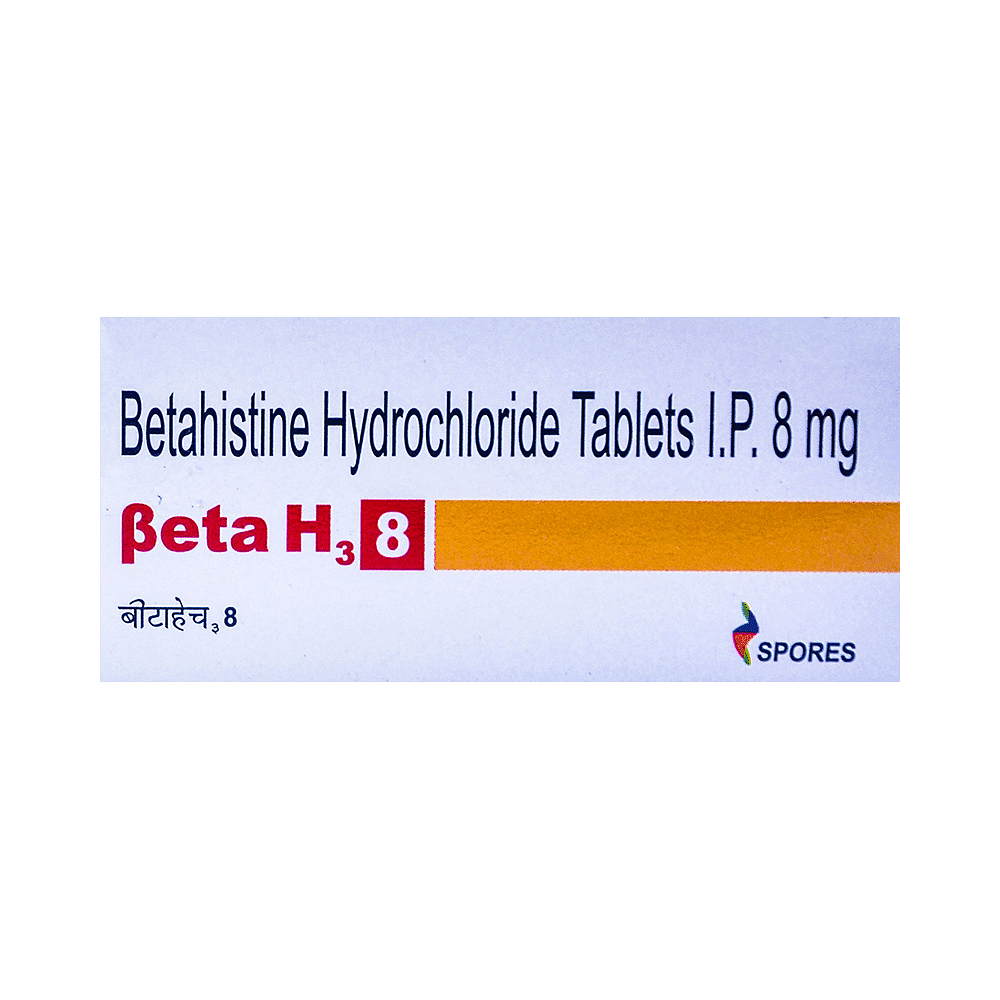
Vertijem 8mg Tablet
Manufacturer
Vibcare Pharma Pvt Ltd
Salt Composition
Betahistine (8mg)
Key Information
Short Description
Vertijem 8mg Tablet is used to prevent and treat a disorder of the inner ear known as Ménière’s disease, which includes symptoms such as dizziness (vertigo), ringing in the ears (tinnitus), and loss of hearing, probably caused by fluid in the ear.
Dosage Form
Tablet
Introduction
Vertijem 8mg Tablet should be swallowed whole with water and taken at the same time(s) each day to get the most benefit. Your doctor will decide what is the correct dose to relieve your symptoms and how often you need to take it. You may need to take this medicine for several months and you should take it for as long as prescribed by your doctor even if you start feeling better. The most common side effects include headache, feeling sick, and indigestion (dyspepsia). You may also get stomach pain and bloating. Taking the medicine with food can help reduce stomach problems.
Directions for Use
Take this medicine in the dose and duration as advised by your doctor. Swallow it as a whole. Do not chew, crush, or break it. Vertijem 8mg Tablet may be taken with or without food but it is better to take it at a fixed time.
Safety Information
Side Effects
Headache Feeling sick Indigestion (dyspepsia) Stomach pain Bloating
Alcohol Warning
Consuming alcohol with Vertijem 8mg Tablet does not cause any harmful side effects.
Breastfeeding Warning
Vertijem 8mg Tablet is probably unsafe to use during breastfeeding. Limited human data suggests that the drug may pass into the breastmilk and harm the baby.
Pregnancy Warning
Vertijem 8mg Tablet may be unsafe to use during pregnancy. Although there are limited studies in humans, animal studies have shown harmful effects on the developing baby. Your doctor will weigh the benefits and any potential risks before prescribing it to you. Please consult your doctor.
Interacting Medicines
Astemizole Azelastine Buclizine Cetirizine
How it works
Vertijem 8mg Tablet is a histamine analog. It works by improving the blood flow in the inner ear which reduces the pressure of excess fluid there. Excess fluid can send signals to the brain causing nausea, dizziness or spinning sensations (symptoms of Ménière's disease). Vertijem 8mg Tablet additionally dampens down the nerve signals sent from the inner ear to the brain relieving the symptoms of Ménière's disease.
Quick Tips
You have been prescribed Vertijem 8mg Tablet to relieve vertigo (dizziness), hearing problems, and tinnitus (noise in the ear) associated with Ménière's disease. It can only decrease the number and severity of attacks but may not completely stop them. Taking it with food can help reduce stomach problems. Take it at the same time each day to maintain a steady amount of the medicine in your body. Inform your doctor if you have a history of stomach ulcer, asthma, or low blood pressure. Inform your doctor if you are pregnant, planning pregnancy, or breastfeeding. Do not stop taking the medicine suddenly without talking to your doctor first.
Related Medicines

Betavert Tablet

Vertin 8 Tablet

Beta H3 8 Tablet

Femvert 8mg Tablet

Vertact 8mg Tablet

Betin 8mg Tablet

Bstil 8mg Tablet

Vertof 8mg Tablet

Histen 8 Tablet

Ronyvert 8mg Tablet
Frequently asked questions
What is Meniere's disease? Does it go away?
Meniere's disease is a disorder of the balance and hearing organs in the inner ear, characterized by symptoms such as vertigo, fluctuations in hearing, tinnitus (ringing or buzzing in the ears), and pressure in the ears. The condition can be unpredictable and may come and go, but with proper treatment and lifestyle modifications, it is possible to manage the symptoms and improve quality of life.
Is Vertijem 8mg Tablet effective?
Vertijem 8mg Tablet has been shown to be an effective medication for treating vertigo and other balance-related disorders. When used as directed by a healthcare professional, it can help alleviate symptoms and improve overall well-being. It is essential to follow the recommended dosage and duration of treatment to achieve optimal results.
What are the triggers for Meniere's disease?
Meniere's disease can be triggered or exacerbated by various factors such as stress, fatigue, emotional distress, certain medications, and environmental changes like pressure fluctuations. Additionally, dietary choices, such as consuming high-sodium foods, may also contribute to the condition. A healthcare professional can provide personalized guidance on managing triggers and developing a tailored treatment plan.
What if I forget to take a dose of Vertijem 8mg Tablet?
If you miss a dose of Vertijem 8mg Tablet, take it as soon as you remember. However, if it is almost time for your next scheduled dose, skip the missed one and resume your regular dosing schedule. Do not double the dose to make up for the missed one, as this may increase the risk of side effects.
Is stress a reason for vertigo?
Mental stress can indeed contribute to feelings of vertigo or dizziness in some individuals. While it is not typically a primary cause of vertigo, stress can exacerbate existing conditions and make symptoms worse. It is essential to manage stress through relaxation techniques, exercise, and other healthy habits to help alleviate vertigo symptoms.
What are the causes of vertigo?
Vertigo can be caused by a variety of factors such as inner ear problems (Meniere's disease or acoustic neuroma), motion sickness, certain medications, and changes in blood pressure. In some cases, vertigo may be a symptom of underlying conditions like multiple sclerosis or head trauma. If you experience persistent or severe vertigo symptoms, consult with a healthcare professional for proper evaluation and treatment.
How long should Vertijem 8mg Tablet be taken?
The duration of treatment with Vertijem 8mg Tablet can vary depending on individual response to the medication and the specific condition being treated. It is essential to follow your healthcare provider's instructions regarding dosage and treatment duration. Regular monitoring and adjustments may be necessary to ensure optimal results.
What are the common side effects of Vertijem 8mg Tablet?
Common side effects associated with Vertijem 8mg Tablet include mild stomach problems such as vomiting, stomach pain, bloating, and abdominal distension. To minimize these risks, take the medication with food as directed by your healthcare professional. If you experience severe or persistent side effects, consult with your doctor for guidance on managing symptoms.


